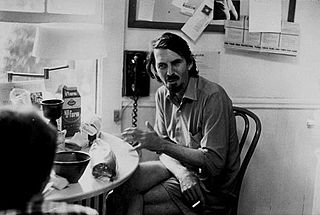
Robert White Creeley was an American poet and author of more than sixty books. He is usually associated with the Black Mountain poets, though his verse aesthetic diverged from that school. He was close with Charles Olson, Robert Duncan, Allen Ginsberg, John Wieners and Ed Dorn. He served as the Samuel P. Capen Professor of Poetry and the Humanities at State University of New York at Buffalo. In 1991, he joined colleagues Susan Howe, Charles Bernstein, Raymond Federman, Robert Bertholf, and Dennis Tedlock in founding the Poetics Program at Buffalo. Creeley lived in Waldoboro, Buffalo, and Providence, where he taught at Brown University. He was a recipient of the Lannan Foundation Lifetime Achievement Award.
The Language poets are an avant-garde group or tendency in United States poetry that emerged in the late 1960s and early 1970s. The poets included: Bernadette Mayer, Leslie Scalapino, Stephen Rodefer, Bruce Andrews, Charles Bernstein, Ron Silliman, Barrett Watten, Lyn Hejinian, Tom Mandel, Bob Perelman, Rae Armantrout, Alan Davies, Carla Harryman, Clark Coolidge, Hannah Weiner, Susan Howe, James Sherry, and Tina Darragh.

Charles Bernstein is an American poet, essayist, editor, and literary scholar. Bernstein is the Donald T. Regan Professor, Emeritus, Department of English at the University of Pennsylvania. He is one of the most prominent members of the L=A=N=G=U=A=G=E or Language poets. In 2006 he was elected a Fellow of the American Academy of Arts and Sciences. and in 2019 he was awarded the Bollingen Prize from Yale University, the premiere American prize for lifetime achievement, given on the occasion of the publication of Near/Miss. Bernstein was David Gray Professor of Poetry and Poetics at SUNY-Buffalo from 1990 to 2003, where he co-founded the Poetics Program. A volume of Bernstein's selected poetry from the past thirty years, All the Whiskey in Heaven, was published in 2010 by Farrar, Straus, and Giroux. The Salt Companion to Charles Bernstein was published in 2012 by Salt Publishing.

Susan Howe is an American poet, scholar, essayist and critic, who has been closely associated with the Language poets, among other poetry movements. Her work is often classified as Postmodern because it expands traditional notions of genre. Many of Howe's books are layered with historical, mythical, and other references, often presented in an unorthodox format. Her work contains lyrical echoes of sound, and yet is not pinned down by a consistent metrical pattern or a conventional poetic rhyme scheme.
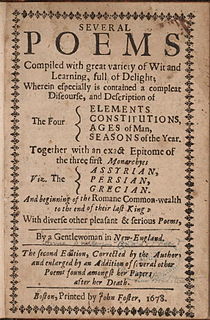
American poetry refers to the poetry of the United States. It arose first as efforts by American colonists to add their voices to English poetry in the 17th century, well before the constitutional unification of the Thirteen Colonies. Unsurprisingly, most of the early colonists' work relied on contemporary English models of poetic form, diction, and theme. However, in the 19th century, a distinctive American idiom began to emerge. By the later part of that century, when Walt Whitman was winning an enthusiastic audience abroad, poets from the United States had begun to take their place at the forefront of the English-language avant-garde.
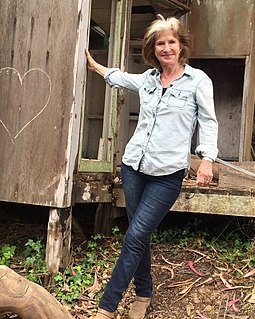
Carolyn D. Wright was an American poet. She was a MacArthur Fellow, a Guggenheim Fellow, and the Poet Laureate of Rhode Island.

Anselm Paul Alexis Hollo was a Finnish poet and translator. He lived in the United States from 1967 until his death in January 2013.
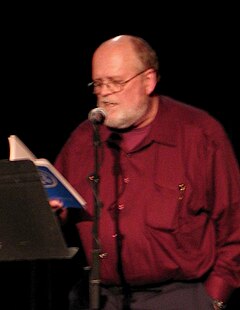
Ron Silliman is an American poet. He has written and edited over 30 books, and has had his poetry and criticism translated into 12 languages. He is often associated with language poetry. Between 1979 and 2004, Silliman wrote a single poem, The Alphabet. He has now begun writing a new poem, Universe, the first section of which appears to be called Revelator.

Léonie Fuller Adams was an American poet. She was appointed the seventh Poet Laureate Consultant in Poetry to the Library of Congress in 1948.
Spam poetry, sometimes called spoetry, is poetic verse composed primarily from the subject lines or content of spam e-mail messages.

Kenneth Goldsmith is an American poet and critic. He is the founding editor of UbuWeb and since 2020 is the ongoing artist-in-residence at the Center for Programs in Contemporary Writing (CPCW) at the University of Pennsylvania, where he teaches. He is also a senior editor of PennSound at the University of Pennsylvania. He hosted a weekly radio show at WFMU from 1995 until June 2010. He has published ten books of poetry, notably Fidget (2000), Soliloquy (2001), Day (2003) and his American trilogy, The Weather (2005), Traffic (2007), and Sports (2008). He is the author of three books of essays, Uncreative Writing: Managing Language in the Digital Age (2011), Wasting Time on The Internet (2016), and Duchamp Is My Lawyer: The Polemics, Pragmatics, and Poetics of UbuWeb (2020). In 2013, he was appointed the Museum of Modern Art's first poet laureate.
Nationality words link to articles with information on the nation's poetry or literature.
Mark Pawlak is a Polish-American poet and educator.
o•blék: a journal of language arts was a small literary magazine founded by Peter Gizzi who co-edited it with Connell McGrath. The magazine published a number of poems often not in the mainstream but recognized for their excellence. The magazine ran from 1987 to 1993.

Cole Swensen is an American poet, translator, editor, copywriter, and professor. Swensen was awarded a 2006 Guggenheim Fellowship and is the author of more than ten poetry collections and as many translations of works from the French. She received her B.A. and M.A. from San Francisco State University and a Ph.D. in Comparative Literature from the University of California, Santa Cruz, and served as the Director of the Creative Writing Program at the University of Denver. She taught at the Iowa Writers' Workshop at the University of Iowa until 2012 when she joined the faculty of Brown University's Literary Arts Program.

Frank X Walker is an African-American poet from Danville, Kentucky. Walker coined the word "Affrilachia", signifying the importance of the African-American presence in Appalachia: the "new word ... spoke to the union of Appalachian identity and the region's African-American culture and history". He is a Professor in the English department at the University of Kentucky and was the Poet Laureate of Kentucky from 2013-2015.
Peter Seaton was an American poet associated with the first wave of Language poetry in the 1970s. During the opening and middle years of Language poetry many of his long prose poems were published, widely read and influential. Seaton was also a frequent contributor to L=A=N=G=U=A=G=E, one of the influential magazines and theoretical venues for Language poetry, co-edited by Charles Bernstein. In 1978, Bernstein published Seaton's first book of poetry, Agreement, the same year that L=A=N=G=U=A=G=E magazine made its first appearance. Some of Seaton's work from this time has been reprinted in The L=A=N=G=U=A=G=E Book (1984).
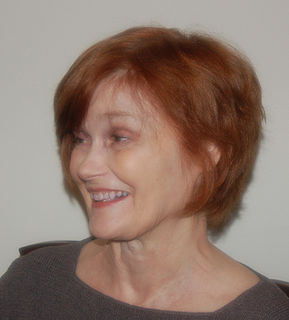
Kelly Cherry is a novelist, poet, essayist, and a former Poet Laureate of Virginia (2010–2012). A resident of Halifax, Virginia, she was named the state's Poet Laureate by Governor Bob McDonnell in July 2010. She succeeded Claudia Emerson in this post.
Amy King is an American poet, essayist, and activist.

Jonathan Stalling is an American poet, scholar, editor, translator, professor, and inventor who works at the intersection of English and Chinese. He is the Harold J & Ruth Newman Chair for US-China Issues and Co-Director of the Institute for US-China Issues, and is Professor of International and Area Studies at the University of Oklahoma. He is also the affiliate English professor at the University of Oklahoma where he serves as the founding curator of the Chinese Literature Translation Archive (CLTA), and as a founding editor of Chinese Literature Today (CLT) journal and as the editor of the CLT book series published by the University of Oklahoma Press.












